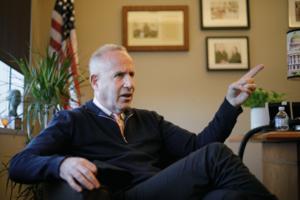Parents
/Home & Leisure

Family guide to new movie releases
'DEADPOOL & WOLVERINE'
Rated R for strong bloody violence and language throughout, gore and sexual references.
What it’s about: Irascible potty-mouthed superhero Deadpool teams up with stoic Wolverine in a farewell salute to 20th Century Fox's Marvel era (as produced by Disney).
The kid attractor factor: Teens will definitely be drawn to ...Read more

Forget upgrading the family car. These parents bought cargo bikes instead
CHICAGO -- Kevin Dekkinga’s son was going to elementary school and the family faced a decision: buy a second car, or buy a new cargo bike.
His son would attend a Chicago Public Schools magnet school in a different neighborhood. His wife worked in the suburbs. And with CPS facing a bus driver shortage after the pandemic that left school bus ...Read more

Pricey camps. Family favors. Early dashes from work. How do parents survive summer?
LOS ANGELES — Kristen Dang’s tenuously planned child-care schedule is in full summer swing — a costly, worry-inducing logistical feat that has tested her maternal prowess. And she considers herself among the fortunate.
She nabbed a coveted six weeks of camp for her soon-to-be 9-year-old son, Brady, at the Reseda Recreation Center. Back in...Read more

Family guide to new movie releases
'TWISTERS'
Rated PG-13 for intense action and peril, some language and injury images.
What it’s about: A group of scientists and storm chasers tangle with tornadoes in Oklahoma during a busy outbreak of storms.
The kid attractor factor: Kids and teens might be drawn to the action/action and thrills.
Good lessons/bad lessons: You can't lets...Read more

Family guide to new movie releases
'LONGLEGS'
Rated R for bloody violence, disturbing images and some language.
What it’s about: A young female FBI agent tracks down a mysterious serial killer.
The kid attractor factor: This is a creepy and terrifying horror thriller — not much appeal for kids.
Good lessons/bad lessons: Sometimes the answers we seek are within.
Violence:...Read more

Billboards seek to reunite decades-old kids' drawings with their now-grown creators
ORLANDO, Fla. -- The two Sanford, Florida, students used crayons to draw self portraits, then turned their artwork over to Crayola, the famous art-supply company, which 20 years ago was collecting kids’ drawings to display in galleries across the country.
“I hope one day to be in an art gallery or in a famous museum,” wrote Emily, then a ...Read more

Family guide to new movie releases
'DESPICABLE ME 4'
Rated PG for action and rude humor.
What it’s about: Supervillain Gru and family have to go into witness protection after a threat from a rival. Wacky high jinks ensue.
The kid attractor factor: It's animated and it features Minions.
Good lessons/bad lessons: Try to find the root of the problem before things spiral out of...Read more

Too much screen time harms children, experts agree. So why do parents ignore them?
LOS ANGELES -- Parents are bombarded with a dizzying list of orders when it comes to screen time and young children: No screens for babies under 18 months. Limit screens to one hour for children under 5. Only "high-quality" programming. No fast-paced apps. Don't use screens to calm a fussy child. "Co-view" with your kid to interact while ...Read more

Family guide to new movie releases
'HORIZON: AN AMERICAN SAGA - CHAPTER 1'
Rated R for violence, some nudity and sexuality.
What it’s about: A sprawling interconnected narrative about a group of settlers in the Old West descending on a place of promise called Horizon.
The kid attractor factor: Not much, this is more of an adult drama.
Good lessons/bad lessons: Guns, guns ...Read more

I thought I'd be happy to finish motherhood's many chores. Then I choked up over laundry
This column is the latest in a series on parenting children in the final years of high school, "Emptying the Nest."
____
As I did what felt like my 18th load of laundry last weekend, most of it belonging to my 17-year-old daughter, I felt a strange catch in my throat.
In a little over a year, my three-decade indenture as a full-time ...Read more

Family guide to new movie releases
'THE BIKERIDERS'
Rated R for language throughout, violence, some drug use and brief sexuality.
What it’s about: Follows the lore of a Chicago biker gang in the 1960s.
The kid attractor factor: This is an adult drama, not for kids.
Good lessons/bad lessons: Beware the sexy biker, he just might upend your life.
Violence: Some extreme bloody...Read more

Family guide to new movie releases
'INSIDE OUT 2'
Rated PG for some thematic elements.
What it’s about: The emotions in young Riley's head have to contend with puberty, which brings a new cast of complex characters to headquarters: Anxiety, Envy, Ennui and Embarrassment.
The kid attractor factor: The animation and kid-friendly story.
Good lessons/bad lessons: Every emotion ...Read more

Commentary: Queer people have shaped America. Why celebrating that fact protects kids
When I was about 10 years old, I blurted out a sentence that would reshape my life.
"Marky Mark," I said, "is sexy."
I had only a partial understanding at the time of what that word meant, but I knew it applied to Mark Wahlberg, who in 1995 was a young rapper and muscled Calvin Klein model. I also knew, suddenly and irrevocably from that ...Read more

In this suburb, more than half of young adults live with their parents. Why?
ELK GROVE, Calif. -- Alexis Farrow is thrilled to finally move into her studio apartment in Elk Grove this month. She recently went for a walkthrough and has already imagined what decorations she will have on the walls.
Farrow, 31, has lived at home with her parents all her life and will experience for the first time what it’s like to live ...Read more

Family guide to new movie releases
'BAD BOYS: RIDE OR DIE'
Rated R for strong violence, language throughout and some sexual references.
What it’s about: Mike and Marcus, Miami detectives, are back to battle drug cartels and accusations of corruption. They'll reckon with their personal lives and their own mortality along the way.
The kid attractor factor: The shiny, colorful ...Read more

Is exploding cost of raising kids going to shrink Southern California?
Want to have a kid or three?
"Want" is a key word here. Contrary to some pop culture chatter about the supposedly expanding number of young adults who don’t want kids, at least some new polling suggests the opposite might be true. Not only do most people who can have kids want them, the desire for bigger families – three or more kids – is...Read more

Family on quest to run race in every county in Georgia. All 159 of them
In early 2016, John Coleman of Decatur, Georgia, met a local runner who completed a major feat: running a race in every state in the country. All 50 of them.
“It sounded like so much fun,” recalled Coleman’s wife, Ashley, who had recently taken up running.
But reality check: “Logistically, we had small children, and well, that wasn’t...Read more

Family guide to new movie releases
'EZRA'
Rated R for language, some sexual references and drug use.
What it’s about: A stand-up comic takes his autistic son on a spontaneous road trip across the country, setting out for L.A. to perform on Jimmy Kimmel.
The kid attractor factor: This is more of an adult drama, but young actor William A. Fitzgerald is an appealing new screen ...Read more

Sacramento Mayor Darrell Steinberg wants to keep program that lets kids ride transit for free
SACRAMENTO, Fla. — The Sacramento City Council Tuesday took a step toward keeping a popular program that allows kids to ride public transit for free.
City Manager Howard Chan had proposed cutting the program in light of a looming $66 million budget deficit, saving the city $1 million.
Mayor Darrell Steinberg suggested keeping it — one of ...Read more

Family guide to new movie releases
'THE GARFIELD MOVIE'
Rated PG for action/peril and mild thematic elements.
What it’s about: Everyone's favorite lazy, lasagna-loving orange cat embarks on an improbable milk heist with faithful pup Odie and his estranged dad Vic.
The kid attractor factor: The animation and kid-friendly story.
Good lessons/bad lessons: Sometimes it takes an...Read more
Popular Stories
- Family guide to new movie releases
- Pricey camps. Family favors. Early dashes from work. How do parents survive summer?
- Forget upgrading the family car. These parents bought cargo bikes instead
- Is exploding cost of raising kids going to shrink Southern California?
- Family on quest to run race in every county in Georgia. All 159 of them





